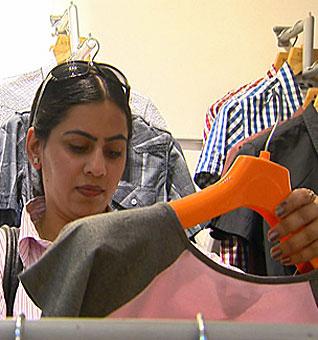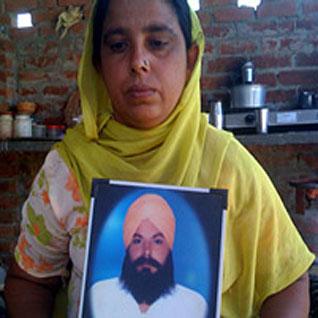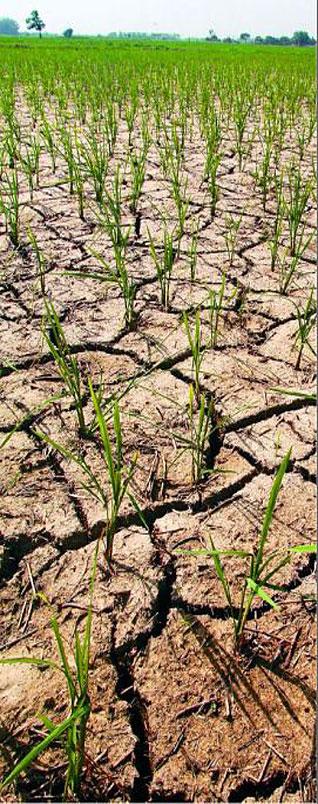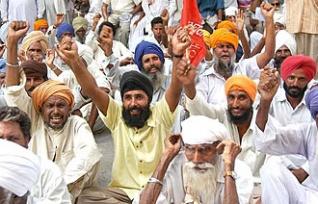Current Events
Indian Elections:
Different Hopes and Aspirations
by BARNABY PHILLIPS
I met Sukhwinder Kaur in the village of Boparai Khurd, a small farming community in the heart of India's flat and fertile Punjab state.
This is a relatively wealthy part of the Indian countryside - many farmers have tractors, and the village houses are made of brick and cement, rather than mud and straw.
But Sukhwinder has a heartbreaking story of poverty and despair.
Her husband, Sukhwinder Singh, grew wheat on his small patch of land, and borrowed some money to rent a couple more hectares.
DEBT TRAP
The cost of inputs - fertilisers, pesticides and diesel - went up and up, and he began to sink into debt.
"He had started to drink," Sukhwinder Kaur told me. "But I didn't know he was in so much trouble."
On the morning of May 14, 2007, she went to their bedroom to serve him tea, but found the door locked. He did not respond to her knocking.
With the help of friends, she broke the door down. Her husband's body was found hanging from the ceiling fan.
Farmer suicides have been a scourge across the Punjabi and Indian countryside for many years - a shocking indictment of the country's failure to include all its citizens in the country's growing prosperity and development.
But in this part of the Punjab, they are a relatively new phenomena.
Since her husband's death, Sukhwinder has struggled to keep her two children in school. She has submitted the forms for a widow's pension, but says "the application has been lost in the system somewhere, I am still waiting."
She's sceptical that whatever government emerges from these latest elections will care about people like her.
"I want my children to be educated, and have good jobs," she says. "I want their lives to be easier than ours have been. My husband lost his life because of farming, I don't want my children to be farmers, but to have something more."
A DIFFERENT WORLD
Savneet Kaur is another young Punjabi woman. She lives in the state capital, Chandigarh.
This neat, prosperous city is not far from the village of Boparai Khurd, but it might as well be a different world.
Savneet is a self-confident young woman, who dresses in stylish western clothes, and enjoys her job as a claims manager with a major insurance company. We met her in a trendy clothes shop in the city centre.
Savneet is ambitious and optimistic about the future. India is moving forward, and she feels that she is in the right place, at the right time.
She says that the global recession has not hurt India as badly as other countries, and that "right now, things are changing, we are very well educated, girls are also getting a good education, and, .... we have a lot of things to explore."
Savneet is prepared to work elsewhere in the country in order to realize her dreams, but unlike many of her friends and contemporaries, she sees no reason to move abroad.
"In this country, I can have a good house, car and job, so why would I want to go anywhere else?"
HIGH EXPECTATIONS
It is difficult to write about India's enormous inequalities without resorting to cliches - that this is a nuclear superpower, a country of gleaming new shopping malls and billionaires, but also a country where almost half of all children under the age of five suffer from malnutrition.
[The new government] is going to find it very difficult to meet the hopes and aspirations of all its people.
It must try to alleviate the despair of Sukhwinder, and millions of poor rural people.
At the same time, it must try and maintain this country's recent growth, even in the midst of a global recession, to keep the trust and confidence of Savneet and the huge urban middle-class that has seen life improve in recent years.
For now, the excited chatter of the elite in Delhi is all about horse-trading, hasty alliances, coalition building and duplicitous politicians.
But when the dust settles, there will be much work to be done.
[Courtesy: Al Jazeera]
May 16, 2009
Conversation about this article
1: Maninder Singh (Delhi, India), May 17, 2009, 12:59 AM.
True story of India! Sardar Manmohan Singh has to do a lot more ... He wished to improve two things, Energy and Education. He has been successful in implementing the Nuclear power plants deal. Now it's time to provide better education facilities to everyone.
2: Kanwal Nain Singh (Lindsay, Ontario, Canada), May 18, 2009, 5:58 PM.
Sukhwinder's is a tragic story indeed. We have also read a lot about rich farmers in Punjab who live in full luxury, in bungalow homes, with Mercedes cars parked in their garages. I am wondering if some social worker, or a young aspiring student doing post graduate studies at Punjab ubiversity, or any other agricultural expert, ever researched the number of farmers on the poverty line, and those very well off. What is the minimum land-holding which makes farming economical? I thought that electric power was available to the farmers free of cost in Punjab, and there was no tax on farm income. As one living away from the subcontinent for over 40 years, my mind is still inquisitive about the real health of the Punjabi peasantry. Will some one throw some light on the economic health of a small landholder in Punjab? What resources are available to those like Sukhwinder and her late husband?






